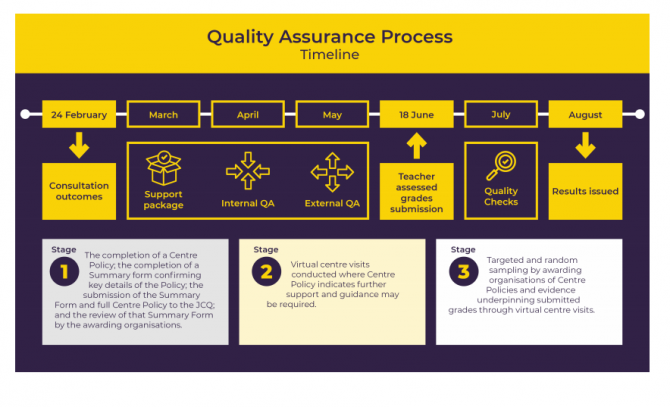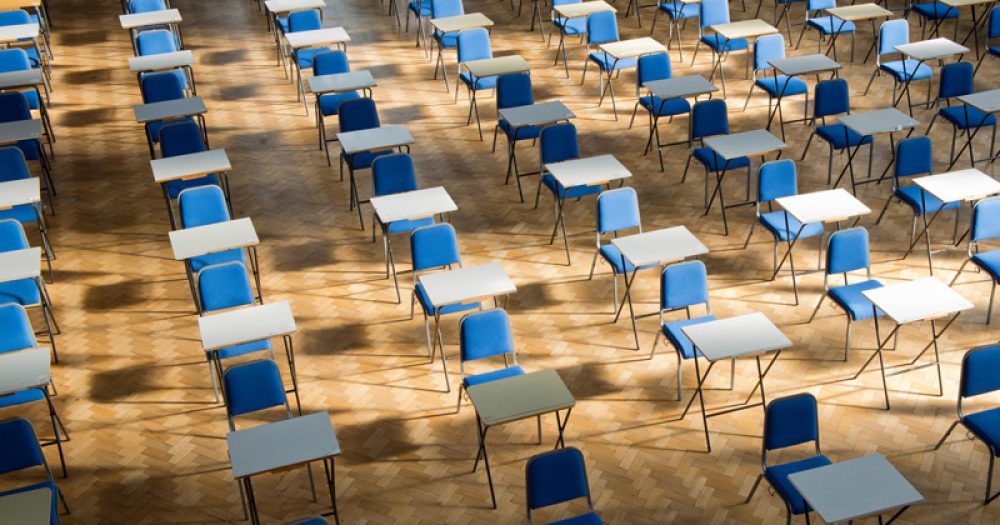Schools will have to provide samples of student work within two days of being asked under the quality assurance process for teacher assessed grades this year.
It is the latest Ofqual update to the grading process this year – with just under eight weeks to go until the submission deadline on June 18.
In a blog published today, Cath Jadhav, Ofqual’s director of standards and comparability, said exam boards would request samples of work from all schools.
This process will form part of the third stage of quality assurance, which involves sampling of schools’ grades after submission.
The disclosure has prompted angry responses from school leaders.
Jonny Uttley, chief executive of the TEAL multi academy trust, said it is a “bureaucratic waste of time”.
Stuart Lock, chief executive of Advantage Schools, said there was “no point” in the submission which would “give a façade of validity and cost millions of hours of adults’ time which should be focused on the children”.
“This is really disappointing from Ofqual,” he added. “I presume it is so that they can be seen to be doing something.”
Others have pointed out how the checks fit with Gavin Williamson’s promise to “trust teachers” over this year’s grading process.
Exam boards will request samples from at least five students in at least one subject at A-level and two subjects at GCSE, one of which is likely to be either English language or maths.
Boards will let schools know which subjects and students have been selected for sampling in the week of June 21.
Jadhav said schools would need to “promptly” submit the evidence – within 48 hours of the request – so it is important a school’s evidence and records “are in good order ahead of that date”.
Subject experts at the boards will then review evidence provided by a sample of schools.
Some will be chosen at random, but others will be targeted based on other factors, such as “significant changes in entry patterns” or where a centre is identified as needing additional support.
Boards will also select schools where the proportion of grades in 2021 appears “significantly higher or lower” than results in previous years when exams took place – 2017, 2018 and 2019.
But the comparison will be made at qualification level, rather than individual subject.
Boards will prioritise checks at schools where results are “more out of line” with historical results.
But Jadhav said it does not mean schools must award grades “to closely match those in previous years” or that the information from previous years “should be used to suppress results”.
“There can be good reasons for results to vary from one year to the next, and centres should record the reasons for any substantial variances, in line with the centre’s policy.”
The first two stages of quality assurances involve every school having their centre policy summary reviews by exam boards. Virtual visits will then take place at the second stage, if the board has questions or concerns.
The JCQ guidance published last month said that a school’s failure to engage in quality checks could lead to further investigation.








This will cause massive issues for the art and design subjects. We run, amongst others, endorsements in 3D and Fine Art design at both GCSE and A level which often involves the production of large scale and/or 3 dimensional practical work. We were planning for students to spend as much time as possible creating practical work before our assessment window in order to get the best outcomes for our students. Now we will have to ask students to spend time phototgraphing and documenting all this work and adding this to their digital portfolios so that this can be submitted to the exam board. We will also have to quality check the photographs submitted to ensure they show the work in the best light. The only other option will be that we will have to spend time as staff photographing all the work and then oragnising and documenting this in an apropriate digital format. All this will impact on the time we need to mark all the work and result in us having to move the deadline for submitting work forward. The practical upshot is less time for the students to complete the work and will negatively impact the grades we can award. We had already decided to set the deadline for submitting work as the 7th May in order to allow enough time for all the work to be marked, standardised, graded, quaity checked by SLT, adjusted in light of SLT quality checking and submitted to the exam baord in time for the deadline. Moving this forward will now not give many our students enough time to complete work to the best of their ability.
I feel this decision is morally reprehensible.
I would like to know if the same quality check applies to vocational courses, both examinable and coursework units.
I believe the board must take an average of scores from each school and compare and formulate a grade boundary based on internal results received as personally our school is very strict with grading. Where a student may have received 75% above as an A, our school gives 80% as an A. This would only mean students in other schools are more likely in recieveing the grade than us which is not fair. Therefore overall average of international school grades should be used to set boundaries and thus grades.